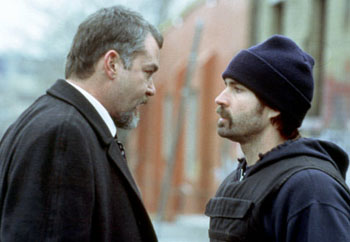![[Metroactive Movies]](/movies/gifs/movies468.gif)
[ Movies Index | Show Times | Silicon Valley | Metroactive Home | Archives ]
Shadows of Motown
'Narc' unleashes Ray Liotta's rogue cop
By Richard von Busack
IN THE MOVIES, police come in two styles: hard-boiled and softhearted. Sacramento director Joe Carnahan (Blood, Guts, Bullets and Octane) captures both of these extremes in his well-acted policier Narc. This small film, promoted by an enthusiastic Tom Cruise, has been heralded as one of the best of the year. Certainly, it's the smartest police movie in a long while, with its furious undercover coppers, its baleful Detroit scenery and its wary, truculent little criminals, none of whom are completely bad. Everyone in Narc has his reasons, which is always a commendable thing in a cop movie.
In the lead, Ray Liotta plays the most frightening rogue detective since Nick Nolte in Sidney Lumet's Q&A. Liotta has the ridiculously macho name Henry Oak. He grew a small but bristling beard and gained weight for the part; the fat looks mixed with muscle, like a linebacker gone to seed. Oak is a mountain of rage with no life away from the job ever since his wife died of cancer. Even the police don't really trust him, and the question of what secrets he holds back keeps you engrossed. This bulldozer cop wants to find out who killed his partner, and thus he's even ready to have a narcotics detective on suspension helping him.
I was eating popcorn during the middle of Narc, and I could hear the crunching echo bouncing off the watchful silence all around me. The more familiar crowd noises--candy wrappers rustling, squeaking seats, people getting up for bathroom breaks--occurred whenever Carnahan cut to the softhearted parts in the home life of Oak's new partner, the previously suspended undercover policeman Nick Tellis (Jason Patric). By pairing up with Oak the brute, Tellis has to take time away from his wife and baby. It's an uncharismatic baby, even for a baby. We don't need to see the baby; he didn't ice Oak's partner. There also needs to be a new way for a movie wife to show her dissatisfaction with husband's work, without the tedious little speech about how she can't go through what they went through before.
I'm less enthusiastic about Narc than I am about 25th Hour, with its fatal arc into destruction. Spike Lee's movie seems like a herald of downbeat moviemaking to come. Narc is more familiar material, reflecting the idea that the bad-news films of the future will look just like bad-news films of the 1970s. We see this effect in everything from Alex Nepomniaschy's hand-held photography of dirty snow and re-emerging prairie in Detroit's brownfields to Patric's souvenir-of-Nogales leather jacket and Village People mustache. Narc isn't even really about narcs per se, since the film concerns a homicide investigation. But Carnahan's robust argument against legal deceit and police brutality is vivid, finishing with a slightly milder, role-reversed version of the "ear scene" in Reservoir Dogs, with a lot of dripping and spitting blood. A critique of the drug war may be implicit here, but it's the explicit violence that will probably win the film favor.
[ Silicon Valley | Metroactive Home | Archives ]
![]()

Narc Passage: Ray Liotta (left) and Jason Patric go way undercover in 'Narc.'
Narc (R; 105 min.), directed and written by Joe Carnahan, photographed by Alex Nepomniaschy and starring Ray Liotta and Jason Patric, plays at selected theaters valleywide.
Send a letter to the editor about this story to letters@metronews.com.
From the January 16-22, 2003 issue of Metro, Silicon Valley's Weekly Newspaper.